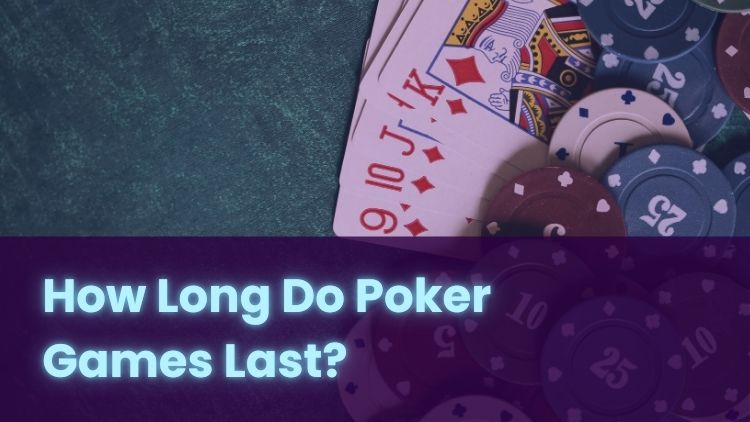
If you're new to poker, you might be wondering how long a typical game can take. It's a fair question, especially if you're thinking about learning how to play or trying it out for the first time.
Poker is a card game that's played in many different ways. Some versions are quick, while others might go on for hours. The time it takes depends on the format you're playing, how many people are at the table, and whether it's played casually at home, online, or in a casino.
This guide explains how long different types of poker games usually last. It breaks down each setting in simple terms, from home games to poker tournaments, and helps you understand what you might expect from a poker session. No matter your level of experience, this guide is written with complete beginners in mind.
How Long Is The Average Poker Game?
There’s no set length for a poker game. It depends on how the game is played and where it's played. For example, if you’re playing with a small group of friends at home, a typical game might go on for 2 to 4 hours. There’s no formal time limit in these cases, so players often take their time between hands.
In casinos or online poker sites, games are more structured. A cash game (where players use real money instead of tournament chips) can last as long as someone wants to keep playing. Some people might play for 30 minutes. Others may stay for several hours.
Tournaments are different. A poker tournament is an event where each player starts with a fixed number of chips. You play until you either run out of chips, or win all the others. This structure means tournaments can go on for hours.
A small online tournament with just a few players might finish in under 2 hours. A large in-person tournament, like those hosted at major UK casinos, can run over several days. For example, the Grosvenor UK Poker Tour sometimes lasts three full days.
How Long Should a Poker Session Last?
A poker session is the amount of time you choose to spend playing. There’s no fixed length. It depends on the type of game, how much time you have, and how you feel.
If you're playing casually at home, the game might carry on until people decide they’ve had enough. These sessions tend to be relaxed. They often include breaks for snacks or conversation.
In an online game or a casino, sessions can be shorter. Players often log in or sit down for 45 minutes to an hour. The pace is usually faster, especially online, because hands are dealt automatically and players have time limits for making decisions.
Some people choose to play short sessions more often, while others prefer longer sessions less frequently. In tournament formats, the session length is set by the structure. For instance, if you're playing a Sit & Go tournament (a smaller online tournament that begins as soon as enough players have joined), it might last around 30 to 60 minutes.
Every player is different. Some like to take breaks every 45 minutes to stay focused. Others prefer to play longer. You can choose what works best for you.
Is There a Time Limit In Poker?
Poker doesn’t usually have a strict time limit, but some formats have features to keep the game moving.
In cash games, especially in casinos or online, there’s no limit on how long the game itself runs. Players can leave the table when they like. However, most games use a timer that gives each person a set amount of time to act on their hand. This is often 20 to 30 seconds. If you don’t act within that time, your hand may be folded or the system might act for you. This keeps the game fair for everyone.
Tournaments, on the other hand, use a level-based structure. Each level lasts a set amount of time — often between 15 and 60 minutes — and the blinds (mandatory bets) increase after each level. For example, in many online poker tournaments, blind levels go up every 10 to 20 minutes. This encourages more action over time.
Once your chips are gone in a tournament, you're out. There’s no option to buy more, unless you're playing in a rebuy tournament, which allows players to buy back in during the early stages.
These built-in timers and structures help manage the flow of the game, but they don’t guarantee a certain result. Poker involves decision-making and chance. There’s no single strategy or amount of playing time that will ensure any specific outcome.
If you’re planning to join a poker game, it may be a good idea to check how long it’s expected to last. This can help you decide what kind of format may suit your time and comfort.
*All values (Bet Levels, Maximum Wins etc.) mentioned in relation to these games are subject to change at any time. Game features mentioned may not be available in some jurisdictions.
**The information provided in this blog is intended for educational purposes and should not be construed as betting advice or a guarantee of success. Always gamble responsibly.
